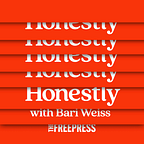For the last month, Ye, formerly known as Kanye West, has been all over the internet with his conspiratorial, antisemitic tirades. Most recently, he went on Alex Jones’ InfoWars show with White Nationalist Nick Fuentes and said things like, “I love Nazis” and “I see good things about Hitler.”
Last month, there was also Kyrie Irving sharing a link to a v…
Continue Reading The Free Press
To support our journalism, and unlock all of our investigative stories and provocative commentary about the world as it actually is, subscribe below.
$8.33/month
Billed as $100 yearly
$10/month
Billed as $10 monthly
Already have an account?
Sign In
Make a comment
Share article



